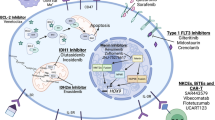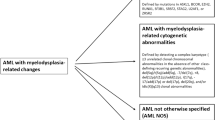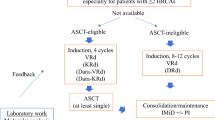Abstract
Myelodysplastic syndromes (MDS) are a group of common bone marrow disorders characterized by ineffective hematopoiesis, peripheral cytopenias, and a substantial risk of progression to acute myeloid leukemia (AML). For many years, the main treatment option for MDS was best supportive care which alleviates symptoms, but has no effect on the natural course of the disease. Recently, demethylating agents have become available as a promising new treatment for patients with MDS. In two randomized clinical trials, the demethylating agent azacitidine has demonstrated a reduced risk of transformation to AML, improvement of peripheral blood values, an improved quality of life, and a definite survival advantage compared to conventional care regimens for patients with International Prognostic Scoring System score of intermediate-2 or high-risk MDS. This review aims to provide practical recommendations for the use of azacitidine and the management of its side effects in patients with MDS, assuring safe administration and best efficacy of treatment.
Similar content being viewed by others
References
Germing U, Aul C, Niemeyer CM et al (2008) Epidemiology, classification and prognosis of adults and children with myelodysplastic syndromes. Ann Hematol 87:691–699
Rollison DE, Howlader N, Smith MT et al (2008) Epidemiology of myelodysplastic syndromes and chronic myeloproliferative disorders in the United States, 2001-2004, using data from the NAACCR and SEER programs. Blood 112:45–52
Greenberg P, Cox C, LeBeau MM et al (1997) International scoring system for evaluating prognosis in myelodysplastic syndromes. Blood 89:2079–2088
Malcovati L, Porta MGD, Pascutto C et al (2005) Prognostic factors and life expectancy in myelodysplastic syndromes classified according to WHO criteria: a basis for clinical decision making. J Clin Oncol 23:7594–7603
Park MJ, Kim HJ, Kim SH et al. (2008) Is International Prognostic Scoring System (IPSS) still standard in predicting prognosis in patients with myelodysplastic syndrome?: External validation of the WHO Classification-Based Prognostic Scoring System (WPSS) and comparison to IPSS. Eur J Haematol.
Haase D, Germing U, Schanz J et al (2007) New insights into the prognostic impact of the karyotype in MDS and correlation with subtypes: evidence from a core dataset of 2124 patients. Blood 110:4385–4395
de Witte T, Suciu S, Verhoef G et al (2001) Intensive chemotherapy followed by allogeneic or autologous stem cell transplantation for patients with myelodysplastic syndromes (MDSs) and acute myeloid leukemia following MDS. Blood 98:2326–2331
Kroger N, Bornhauser M, Ehninger G et al (2003) Allogeneic stem cell transplantation after a fludarabine/busulfan-based reduced-intensity conditioning in patients with myelodysplastic syndrome or secondary acute myeloid leukemia. Ann Hematol 82:336–342
Ho AY, Pagliuca A, Kenyon M et al (2004) Reduced-intensity allogeneic hematopoietic stem cell transplantation for myelodysplastic syndrome and acute myeloid leukemia with multilineage dysplasia using fludarabine, busulphan, and alemtuzumab (FBC) conditioning. Blood 104:1616–1623
Nachtkamp K, Kundgen A, Strupp C et al (2009) Impact on survival of different treatments for myelodysplastic syndromes (MDS). Leuk Res 33:1024–1028
Silverman LR, Demakos EP, Peterson BL et al (2002) Randomized controlled trial of azacitidine in patients with the myelodysplastic syndrome: a study of the cancer and leukemia group B. J Clin Oncol 20:2429–2440
Kornblith AB, Herndon JE 2nd, Silverman LR et al (2002) Impact of azacytidine on the quality of life of patients with myelodysplastic syndrome treated in a randomized phase III trial: a Cancer and Leukemia Group B study. J Clin Oncol 20:2441–2452
Fenaux P, Mufti GJ, Hellstrom-Lindberg E et al (2009) Efficacy of azacitidine compared with that of conventional care regimens in the treatment of higher-risk myelodysplastic syndromes: a randomised, open-label, phase III study. Lancet Oncol 10:223–232
Wijermans P SS, Baila L, Platzbecker U, Giagounidis A, Selleslag D, Labar B, Salih H, Beeldens F, Muus P, de Witte T, Lübbert M (2008) Low dose decitabine versus best supportive care in elderly patients with intermediate or high risk MDS not eligible forintensive chemotherapy: Final results of the randomized phase III study (06011) of the EORTC leukemia and German MDS study groups. Blood 112: abstr 226.
Steensma DP, Baer MR, Slack JL et al (2009) Multicenter study of decitabine administered daily for 5 days every 4 weeks to adults with myelodysplastic syndromes: the alternative dosing for outpatient treatment (ADOPT) trial. J Clin Oncol 27:3842–3848
Kantarjian H, Issa JP, Rosenfeld CS et al (2006) Decitabine improves patient outcomes in myelodysplastic syndromes: results of a phase III randomized study. Cancer 106:1794–1803
Fenaux P, Mufti GJ, Hellstrom-Lindberg E et al (2010) Azacitidine prolongs overall survival compared with conventional care regimens in elderly patients with low bone marrow blast count acute myeloid leukemia. J Clin Oncol 28:562–569
Lyons RM, Cosgriff TM, Modi SS et al (2009) Hematologic response to three alternative dosing schedules of Azacitidine in patients with Myelodysplastic Syndromes. J Clin Oncol 27:1850–1856
Silverman LR, McKenzie DR, Peterson BL et al (2006) Further analysis of trials with azacitidine in patients with myelodysplastic syndrome: studies 8421, 8921, and 9221 by the Cancer and Leukemia Group B. J Clin Oncol 24:3895–3903
Cheson BD, Bennett JM, Kantarjian H et al. Report of an international working group to standardize response criteria for myelodysplastic syndromes. In Edition 2000; 3671-3674.
Cheson BD, Greenberg PL, Bennett JM et al (2006) Clinical application and proposal for modification of the International Working Group (IWG) response criteria in myelodysplasia. Blood 108:419–425
Kaminskas E, Farrell AT, Wang YC et al (2005) FDA drug approval summary: azacitidine (5-azacytidine, Vidaza) for injectable suspension. Oncologist 10:176–182
Aivado M, Rong A, Germing U et al (2000) Long-term remission after intensive chemotherapy in advanced myelodysplastic syndromes is generally associated with restoration of polyclonal haemopoiesis. Br J Haematol 110:884–886
Aul C, Runde V, Germing U, Burk M, Heyll A, Hildebrandt B, Willers R (1997) Remission rates, survival and prognostic factors in 90 patients with advanced MDS treated with intensive chemotherapy. Haematol Blood Transfus 38:918
Haase D (2008) Cytogenetic features in myelodysplastic syndromes. Ann Hematol 87:515–526
Christiansen DH, Andersen MK, Pedersen-Bjergaard J (2003) Methylation of p15INK4B is common, is associated with deletion of genes on chromosome arm 7q and predicts a poor prognosis in therapy-related myelodysplasia and acute myeloid leukemia. Leukemia 17:1813–1819
Knipp S, Hildebrand B, Kundgen A et al (2007) Intensive chemotherapy is not recommended for patients aged >60 years who have myelodysplastic syndromes or acute myeloid leukemia with high-risk karyotypes. Cancer 110:345–352
Hackanson B, Robbel C, Wijermans P, Lubbert M (2005) In vivo effects of decitabine in myelodysplasia and acute myeloid leukemia: review of cytogenetic and molecular studies. Ann Hematol 84(Suppl 1):32–38
Ruter B, Wijermans P, Claus R et al (2007) Preferential cytogenetic response to continuous intravenous low-dose decitabine (DAC) administration in myelodysplastic syndrome with monosomy 7. Blood 110:1080–1082, author reply 1083
Raj K, John A, Ho A et al (2007) CDKN2B methylation status and isolated chromosome 7 abnormalities predict responses to treatment with 5-azacytidine. Leukemia 21:1937–1944
Ravandi F, Issa J-P, Garcia-Manero G et al (2008) Hypomethylating therapy in patients with AML and high-risk MDS and chromosome 5 and 7 abnormalities is associated with an improved outcome compared to conventional chemotherapy. Blood 112:2955a
Lim Z, Ho AYL, Samuel J et al (2007) Outcomes of MDS patients with chromosome 7 abnormalities treated with 5-Azacytidine. Blood 110:1449a
Mufti GJ FP, Hellström-Lindberg E, Santini V, List AF,Gore S, Seymour JF, Silverman LR, Backstrom J, Beach CL (2008) Treatment of high-risk MDS patients (pts) with -7/del(7q) with azacitidine (AZA) versus conventional care regimens (CCR): Effects on overall survival (OS). J Clin Oncol 26: abstr 7033.
Mufti GJ G-MG, Hovarth N, Lim Z, Quesnel B, Leone G, Bennett J, Sanz G, McKenzie D, Backstrom J, Beach CL (2008) Prolonged survival in higher-risk myelodysplastic syndrome (MDS) patients with -7/Del(7q) treated with azacitidine (AZA). Haematologica 93: abstr. 0928.
Robertson KD (2001) DNA methylation, methyltransferases, and cancer. Oncogene 20:3139–3155
Christman JK (2002) 5-Azacytidine and 5-aza-2'-deoxycytidine as inhibitors of DNA methylation: mechanistic studies and their implications for cancer therapy. Oncogene 21:5483–5495
Stresemann C, Lyko F (2008) Modes of action of the DNA methyltransferase inhibitors azacytidine and decitabine. Int J Cancer 123:8–13
Silverman LR, Fenaux P, Mufti GJ et al (2008) The effects of continued Azacitidine (AZA) treatment cycles on response in higher-risk patients (Pts) with myelodysplastic syndromes (MDS). Blood 112:227a
Müller-Thomas C, Schuster T, Peschel C, Götze KS (2009) A limited number of 5-azacitidine cycles can be effective treatment in MDS. Ann Hematol 88:213–219
Borthakur G, Ahdab SE, Ravandi F et al (2008) Activity of decitabine in patients with myelodysplastic syndrome previously treated with azacitidine. Leuk Lymphoma 49:690–695
Platzbecker U AC, Ehninger G, Giagounidis A (2009) Reduction of 5-azacitidine induced skin reactions in MDS patients with evening primrose oil. Annals of Hematology.
Graef T, Kuendgen A, Fenk R, Zohren F, Haas R, Kobbe G (2007) Successful treatment of relapsed AML after allogeneic stem cell transplantation with azacitidine. Leuk Res 31:257–259
Lubbert M, Bertz H, Wasch R et al. Efficacy of a 3-day, low-dose treatment with 5-azacytidine followed by donor lymphocyte infusions in older patients with acute myeloid leukemia or chronic myelomonocytic leukemia relapsed after allografting. Bone Marrow Transplant 2009; in press.
Jabbour E, Giralt S, Kantarjian H, Garcia-Manero G, Jagasia M, Kebriaei P, de Padua L, Shpall EJ, Champlin R, de Lima M (2009) Low-dose azacitidine after allogeneic stem cell transplantation for acute leukemia. Cancer 115:1899–1905
Platzbecker U, Radke J, Kiani A et al (2008) 5-azacitidine treatment of imminent relapse defined by decreasing donor CD34+ progenitor subset chimerism in patients with CD34+ high-risk myelodysplastic syndromes (MDS) or Acute Myeloid Leukemia (AML) after allogeneic stem cell transplantation. Blood 112:2143a
Kuendgen A, Schmid M, Schlenk R et al (2006) The histone deacetylase (HDAC) inhibitor valproic acid as monotherapy or in combination with all-trans retinoic acid in patients with acute myeloid leukemia. Cancer 106:112–119
Soriano AO, Yang H, Faderl S et al (2007) Safety and clinical activity of the combination of 5-azacytidine, valproic acid, and all-trans retinoic acid in acute myeloid leukemia and myelodysplastic syndrome. Blood 110:2302–2308
Silverman LR, Verma A, Odchimar-Reissig R et al (2008) A phase I trial of the epigenetic modulators vorinostat, in combination with Azacitidine (azaC) in patients with the Myelodysplastic Syndrome (MDS) and Acute Myeloid Leukemia (AML): a study of the New York cancer consortium. Blood 112:3656a
Voso MT, Santini V, Finelli C et al (2009) Valproic acid at therapeutic plasma levels may increase 5-Azacytidine efficacy in higher risk myelodysplastic syndromes. Clin Cancer Res 15:5002–5007
Sekeres MA, List AF, Cuthbertson D et al (2008) Final results from a phase I combination study of Lenalidomide and Azacitidine in patients with higher-risk myelodysplastic syndromes (MDS). Blood 112:221a
Acknowledgements
This work was supported by the German Kompetenznetz “Akute and chronische Leukämien”.
Disclosure of potential conflicts of interest
All authors report having served on an advisory board for Celgene within the past 24 months, as well as having received honoraria for lectures from Celgene in the past.
Author information
Authors and Affiliations
Corresponding author
Rights and permissions
About this article
Cite this article
Götze, K., Platzbecker, U., Giagounidis, A. et al. Azacitidine for treatment of patients with myelodysplastic syndromes (MDS): practical recommendations of the German MDS Study Group. Ann Hematol 89, 841–850 (2010). https://doi.org/10.1007/s00277-010-1015-0
Received:
Accepted:
Published:
Issue Date:
DOI: https://doi.org/10.1007/s00277-010-1015-0




